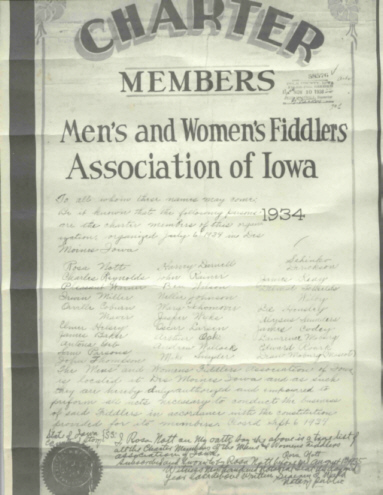Our Humble Beginnings:
In
the heart of Iowa in the early 1920's, people were entertained by music and dance. Technology still had not reached
some places in Iowa. The kind of music that was popular in the area was piano, banjo,
and fiddle tunes. Unfortunately, the only time people could get together for these events was during the day, because
electricity had not reached the rural areas of the state, and, with many of the state's citizens being farmers, daytime was
time to work.
Late in 1924, Rose
Knott of Des Moines decided to start a non profit club exclusively for the betterment of fiddle playing, and they called it
"The Old Fiddlers Association of Iowa". To join he club, you had to be at least 50 years old. The club quickly
became popular, with involvement at the Iowa State Fair and the Fiddle Contest. Soon the Old Fiddlers Association
had state champions at the meetings, which were held on a "wherever and whenever" basis. In 1934, he name was officially
changed to "The Old Men's and Women's Fiddlers Association of Iowa", and a charter was signed.

Slow Times:
With the onset of the
depression and the coming of World War II, the club started to fade. Many of members found it harder to come, and the
club realized that if they did not do something quickly there would not be a club left. So the age limit was dropped
to twenty-five to encourage younger aspiring Fiddlers to join in the mid fifties. A few members we know now took advantage
of this. Weldon Gourd, Don Thomas, Bob Clark, just to name a few.
Today the Old Men's and Women's Fiddlers
Association of has no age limit, and the "Old" prefix has been dropped. It is known now as "The Men's and Women's
Fiddlers Association of Iowa" or simply, "The Fiddlers Association of Iowa". Meetings are now held regularly,
and all age groups and levels of experience are represented. "The Club" is still very involved in events at the Iowa
State Fair, including the very popular State Fair Fiddle Contest and musical entertainment at venues throughout
the fairgrounds. The goal of the club is still "for the betterment of fiddle playing".

|

